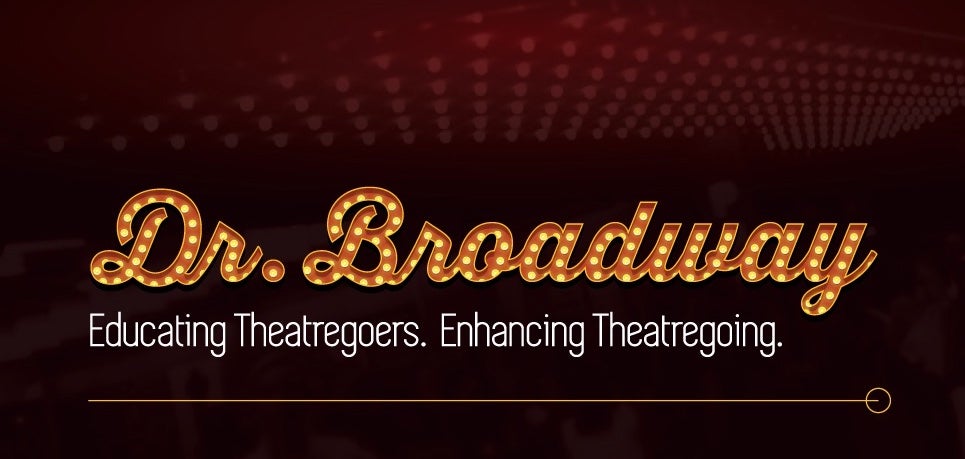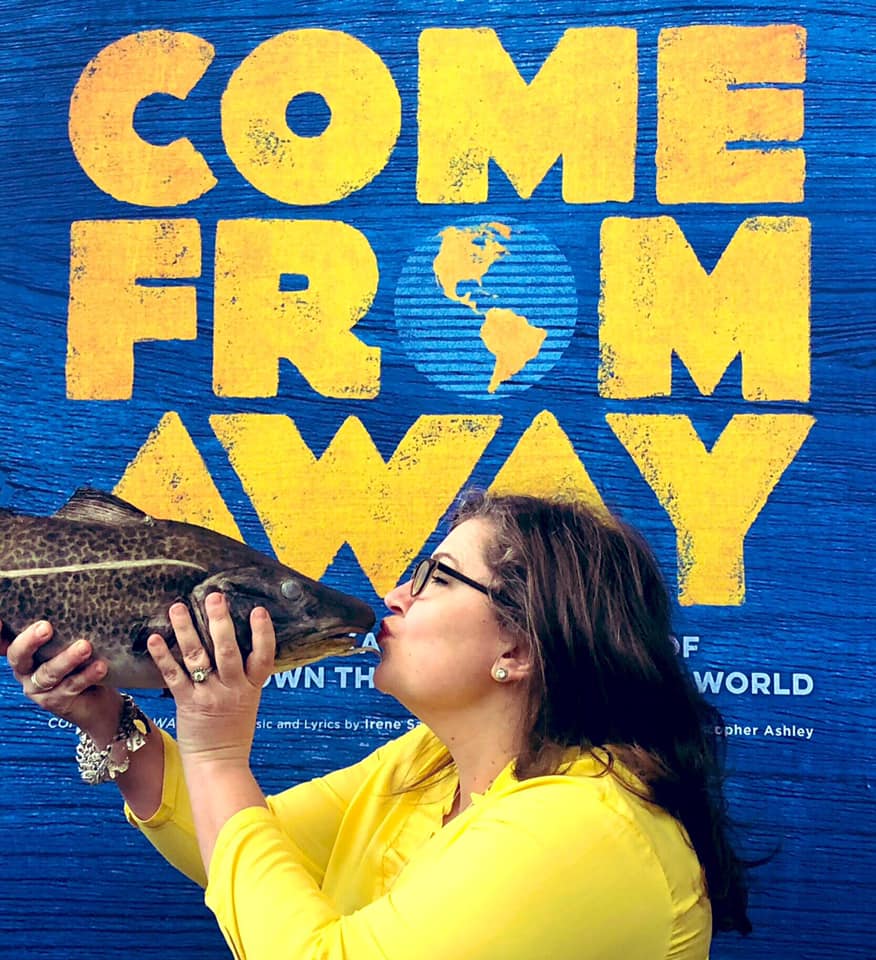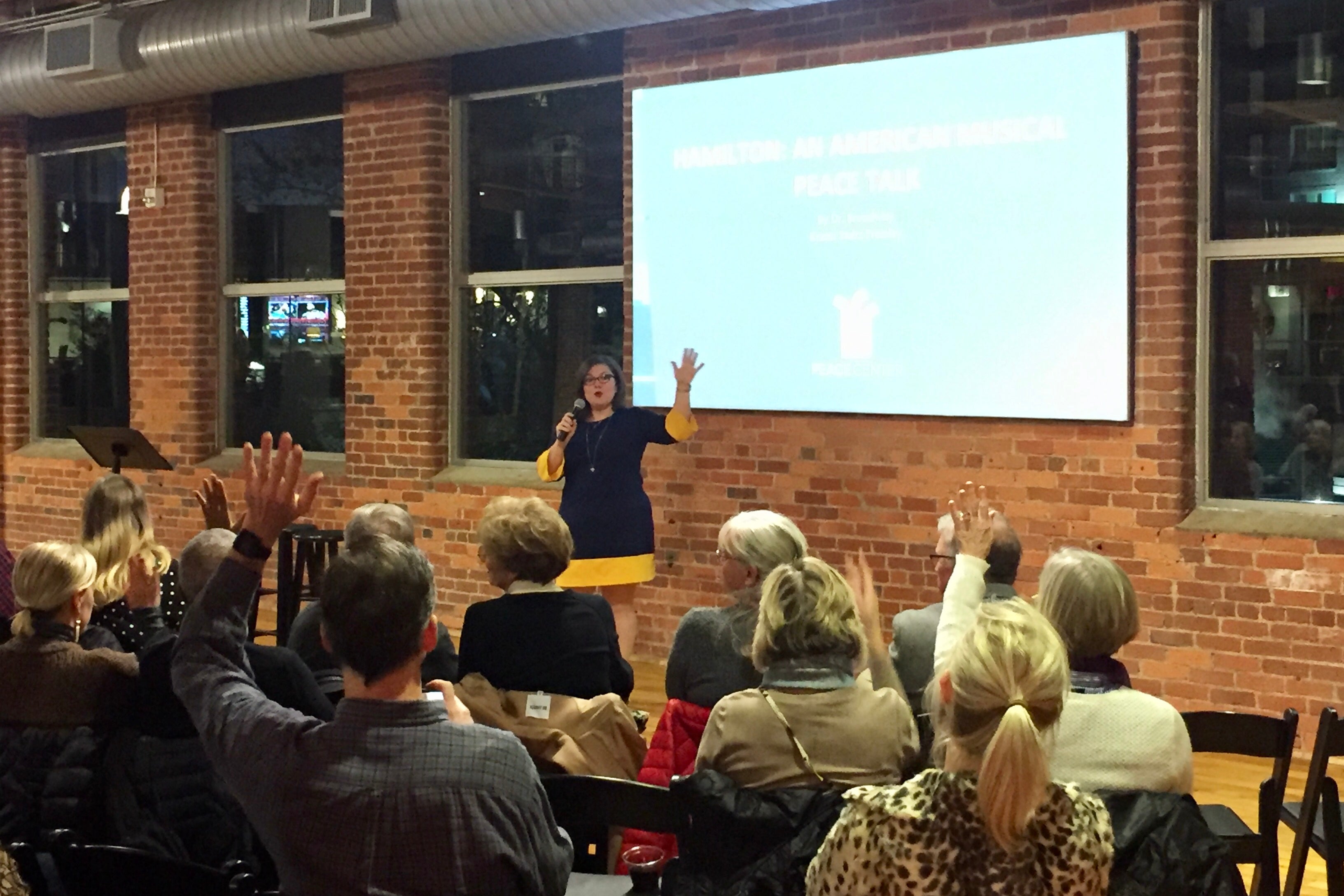
If you're a musical theatre fan, getting the chance to hear from Kristin Stultz Pressley, also known as Dr. Broadway, is like winning the jackpot and getting behind-the-scenes access to all of your favorite shows.
Pressley is a musical theatre historian with southern roots. She holds a PhD from the University of Georgia, and now works as a teaching artist with theatre companies throughout the Southeast. She regularly treks across the Carolinas, Georgia and Tennessee from her home near Asheville, to bring her wealth of knowledge and insights directly to theatregoers. She has also spoken at BroadwayCon in New York City two years in a row and is just about to publish her first book, a biography of lyricist and librettist Dorothy Fields.
Her mission is to educate theatregoers and enhance theatregoing. You can find her in Charlotte as a frequent featured speaker at Blumenthal’s Get to Know the Show series, free events that typically take place uptown during the lunch hour, as well as at select Club Blume Informances. She was in town recently to talk about the upcoming production of COME FROM AWAY.

We sat down afterward for a chat that shimmied from her unique line of work and the current state of musical theatre to surprising backstories for shows and why we should all know more about Fields, the first and only woman inducted into the Songwriters Hall of Fame in its inaugural year, alongside such greats as Duke Ellington, Ira Gershwin, and Johnny Mercer.
Here are highlights from that conversation (with minor edits for brevity and clarity).
Could you tell me about the work you do?
My bread and butter work is talks like you saw today where I’ll take a musical or a couple of musicals or a creative team or a director or a performer and I’ll do a deep dive into how that musical was created, how that performer became what he or she became, that sort of thing. So I just do a deep dive hoping that once you have that information, when you see the show, it’s that much more enriching… What I try to do is arm people with the background information that they need in order to experience the show in the best possible way.

I was amazed by the range of topics you covered in your presentation and you were ready for any question the audience could throw at you. How do you research each show?
We are so fortunate in this day and age that we have podcasts and we have YouTube and I can access newspapers from across the world from the sectional sofa in my den. And I do!... A lot of times, particularly with modern shows, you can listen to podcasts with the creators. You can find interviews with them on YouTube; Google does a great series: “Live at Google;” AOL does a series called the “BUILD series.” And so you can hear directly from the creators or performers. A lot of times I’ll read reviews of the shows and that will lead me down other rabbit trails.
I really just kind of follow what’s interesting to me and assume that If that’s interesting to a passionate theatregoer, then it will be interesting to other passionate theatregoers...It would have been a lot harder to do this 20, 30 years ago...
It’s the greatest job in the world... If you had told me that I could have all the benefits of teaching musical theatre history without the burden of having to grade. I would say you’re crazy! But that’s what I get to do and I am so thankful every day that this is what I get to do.
How does the current musical theatre scene—both in terms of what’s being produced and written—differ from previous generations?
“The money… Musicals cost so much now to produce that you have to have a known entity in order to be sure you’re going to get some—hopefully all—but at least some of your money back. So COME FROM AWAY was a 12 or 13 million dollar [investment] which is an obscene amount of money—particularly given that that’s an unknown. I mean, who knew they would get that back? They’re making a million dollars a week now but who knew. That was a huge gamble. Most producers don’t want to gamble like that.
And so that’s why you see things like PRETTY WOMAN, THE MUSICAL and catalog TINA TURNER musical… because if you’re going to New York and you’re going to spend $150 a seat, which is what theatre tickets cost now—which is unbelievable—if you’re going to spend that much money on a ticket, you want to know you’re going to enjoy it, right?
...In the 1920s they would have 230 openings every Broadway season because it was so much less expensive to develop a show. That declined with the depression so by 1932, it was maybe 187. But the average now is 40. Forty shows a season opening on Broadway.
I’m interested in this new production of COMPANY with the female lead. Does that seem to be happening a lot with revivals now—that there has to be some kind of twist?
Ideally, you want to have a reason to reproduce it. So for instance with OKLAHOMA: they have a whole different spin on what is really a watershed musical, in terms of theatre history, but this current revival that’s on Broadway is done completely differently. It’s much darker. It’s caused a lot of angst between some of the members of the Rodgers and Hammerstein families with the creators of the show. But, nonetheless, it’s a totally different take.
KISS ME KATE, when it was revived in the last year or two—they were trying to come at it through the lens of the Me Too movement…
This COMPANY revival, though, had a hugely popular run in London; now, it’s come to New York and I cannot wait to see it because I love that show. And the girl playing Bobby is Katrina Lenk, whom I also love, because she was in THE BAND’S VISIT.
It’s not always as extreme as gender-bending the casting. Sometimes it’s that but other times it’s just, ‘I’ve got this great idea of producingTHE PAJAMA GAME as a Spaghetti Western’ or whatever.
Do you think that if you talked to anybody you could find a show that they would enjoy?
Probably so... I spend a lot of time thinking about children’s theatre. I have six and seven year old sons. They just saw CHARLIE AND THE CHOCOLATE FACTORY and I’m constantly evaluating what would be appropriate for them to see. But there’s also shows for movie lovers. We talked about PRETTY WOMAN and TOOTSIE and all of those movies—LEGALLY BLONDE—that are being made into [musicals] for the hopeless romantic, certainly there is that in spades but also for the cynic: COMPANY and everything Stephen Sondheim ever did is the perfect example of that… Something for the music lover, be it JERSEY BOYS or BEAUTIFUL or MAMMA MIA! which is just great music. Something for dance lovers, I think of Twyla Tharp: MOVIN’ OUT, which is a Billy Joel dance musical.
Yeah, I think if I knew enough about a person I could probably come up with a musical [they] would be interested in… whether or not they would admit it, is the question.
What have been some of your favorite discoveries, working in this field?
There are so many. I think a lot of them are the near misses, things like the fact that Canadian producers wanted nothing to do with COME FROM AWAY and yet it goes on to become a show that will run for a long, long time and people love across the world...
I love to find little tidbits about [how] ideas for shows came about. One of my favorites is THE PHANTOM OF THE OPERA and how Cameron Mackintosh was in a bathtub when Andrew Lloyd Webber called him and said, ‘what do you think about doing The Phantom of the Opera as a musical?’ And Cameron Mackintosh said ‘Ok, we’ll do it.’ And I just have this vision of him in a top hat and a bubble bath—and that is completely made up in my mind—but I love that. I guess when Andrew Lloyd Webber calls, you take the call no matter when it comes.
I love that story. And then how they wanted to find the exact right version of The Phantom of the Opera so they screened the Lon Chaney silent film and they were like no, that’s not the one.. and then they learned of this old book by this Frenchman named Gaston Leroux. And it was out of print so they couldn’t get it. They couldn’t find their source material. And then I think it was Mackintosh, but it might have been Andrew Lloyd Webber, he found it in his aunt’s basement. She had an old discarded copy… one of those near misses becomes the longest running show on Broadway. What if he hadn’t found that book? That kind of stuff is so interesting.
I know this is probably impossible for you to choose, but do you have a favorite show or a favorite period?
It’s not impossible. It’s easy. My favorite show is THE DROWSY CHAPERONE, which is another Canadian musical. It is another one act (like COME FROM AWAY)—I love one acts. And It’s a show about a man who lives alone in a dingy old apartment and listens to cast albums by himself all the time. And I could relate to that so hard, you know? And he talks about how much he loves it and why he loves it. It’s the most hysterical and yet tender and loving [show]—kind of like a love letter to old musicals—and I absolutely love it. So that’s definitely number one.
I love the golden age musicals… DAMN YANKEES is another one of my all time favorite shows. They’re working on a revival of that—finally! They haven’t done one since ’94. So I love that era but I also love Stephen Sondheim and like I said COMPANY is one of my favorites of all time.
So, that’s not a hard question… in fact a lot of the shows that I see I’m like I will never think of that show again.... Other shows, though, stay with you for weeks, like THE COLOR PURPLE was one of those for me. It just stayed with me and I couldn’t get over it. EVITA, the most recent tour which was a couple years ago, was that way for me. I just woke up for three weeks singing ‘Stand Back, Buenos Aires!’ Some of them stay with you and others don’t, and for everybody that’s different.
How did you first get interested in Dorothy Fields and what are some things people should know about her if they don’t know anything?
It goes back to my master’s thesis. I was a neurotic graduate student who was terrified of writing a master’s thesis. I would go into my advisor, who was a wonderful professor named Rhoda-Gale Pollack (at the University of Kentucky)… probably once a week and we would talk about what the topic should be. No other grad students were doing this because none of them were as crazy as I was! But I was convinced, I’ll never get it done in time…
This is honest to goodness how it happened. One day I was sitting in her office and this name Dorothy Fields—from the Sweet Charity show card—it just flashed across my mind. And I said to Rhoda at the time, ‘what about Dorothy Fields?’
Because we would talk about Cole Porter and Stephen Sondheim and Irving Berlin and all these people whose work I love and she’s like, ‘It’s done. It’s been done. It’s old…’ so trying to find something new, that nobody had talked about, the onus was on me to do that. I was a nervous wreck that I’d never be able to do it.
When I said Dorothy Fields, she said ‘I don’t know anything about her.’
[After conducting some initial research, this is what Pressley discovered.]
- Fields was the first woman to win an Oscar for a song (“The Way You Look Tonight” in 1936 for the film “Swing Time.” She wrote the lyrics and Jerome Kerns wrote the music).
- Other hit songs included: “I’m in the Mood for Love,” “I Can’t Give You Anything But Love,” “On the Sunny Side of the Street,” and “Big Spender.”
- The musical ANNIE GET YOUR GUN was her idea.
- She wrote from 1924 until 1974, when she died.
- She was still working at a very high level until the day she died (at age 69). In fact she spent that day at a rehearsal for a national tour of one of her shows. That same day Tony Award nominations also came out, and she received a nomination for the lyrics she had written for the new musical SEESAW.
The more I learned about Dorothy Fields, the more I loved her. The more I was amazed by her. The more I thought everybody needs to know this woman’s name. They know all of her songs, why do they not know her name?
It became a great passion for me. And it almost felt like [I became] a missionary for Dorothy Fields… I would go into classes and nobody would know who she was… I felt like I needed to carry her banner. I did my dissertation on her as well.
...I kept seeing things show up over the past couple of years on my Facebook feed. You know— first all women creative team, first musical with a female director... And I’m thinking, that is so great, but can we please give some credit to Dorothy Fields, who was doing this when she was the only woman in the room?
She was the first and only woman inducted in the inaugural year (1971) of the Songwriters Hall of Fame… She was able to write those jazzy tunes from the 1920s but at the same time come out with a completely slangy, sexy lyric like “Hey Big Spender” in 1966 and so many others. Her longevity speaks for itself. The fact that her career was able to last so long shows that she was able to bend and fold from jazz to rock ‘n’ roll to the new jazz of Cy Coleman, with whom she worked as her final collaborator. She just was so professionally flexible in a way that a lot of the men who were writing at the time were not...
I started working on her in 2003, submitted the book last September. So it’s been 16 years in the making—and there have been fits and stops, you know, had some children, and took some time off around then so its not been constant but it has been a perpetual passion for me.
I just feel like the time is right for her story.
Look for Dr. Broadway at our next Get to Know the Show event showcasing the hit musical, Anastasia! It takes place March 16th and Booth Playhouse at noon. The event is free, but we ask that you RSVP (click this clink to reserve your spot).
Also be on the lookout for her upcoming book, DOROTHY FIELDS: Her Life in the American Theatre (Applause Books, Fall 2020)